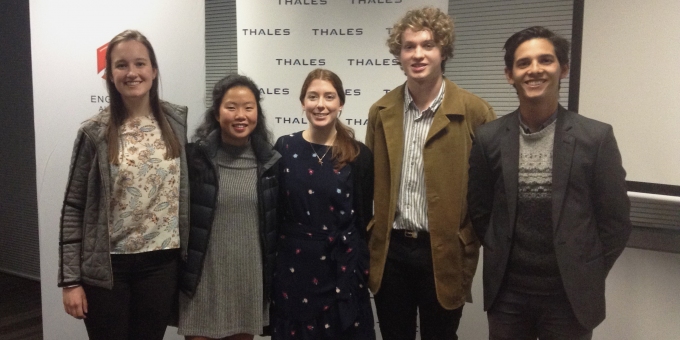ANU College of Engineering and Computer Science students, Thomas Larkin and Ellen Lynch, have taken out First Prize and the People’s Choice awards respectively at the Young Engineers Australia Undergraduate Project Presentation Competition. The competition, held on 15 August, was open to all undergraduate students from Canberra.
The competition is a ‘3 minute thesis’ style format and offers most students their first opportunity to present work to an audience outside of the classroom.
Thomas’ winning project seeks to develop an effective biogas oven for cocoa farmers in Papua New Guinea to dry their beans in the wet season — undoubtedly a complex concept to present.
“This was the first time I had done a ‘3 minute thesis’ style of presentation but I really enjoyed the challenge of trying to condense my work into an engaging but heavily generalised presentation,” he said of the task.
The idea for his project was sparked last year when Thomas attended the Engineers Without Borders design summit in Cambodia, and was attracted to the idea of working in the fields of humanitarian engineering and human-centred design.
“In humanitarian engineering work, developing solutions to solve problems is generally technically simple. Where the complexity lies, is developing a solution that is user-friendly, user-centric, robust, and fit for purpose.”
Having his purpose in mind, his project began with a trip over to Kokopo, East New Britain in April this year for the purpose of data-collection.
“On the back of this trip, I returned to the ANU and began exploring different designs, keeping the requirements of the users who I was able to meet in PNG in mind.”
“It will hopefully manage to increase the value of the cocoa beans in this region and thus, increase the benefits going back to the farmers growing the beans.”
Fellow winner Ellen Lynch’s project is focused on outreach programs for school students in order to inspire the next generation of students to join the profession. It is all about the portrayal of engineering and the perception of the profession amongst young people who otherwise might not consider the field.
“By portraying engineering in a different way, focusing on creativity and positive impact, the aim is to attract a more diverse range of students to engineering, and hence improve the effectiveness and diversity of the engineering profession as a whole,” said Research Engineer and Supervisor Jeremy Smith.
Congratulations to Thomas and Ellen, and all other ANU students who competed on the night.

